You must have heard of the iconic Lijadu sisters, Taiwo and Kehinde Lijadu. The duo, who were deeply rooted in African music, have been on the public scene from as far back as the mid-’60s. Wondering why the mention of The Lijadu Sisters evokes so much nostalgia? You’ll find this a rather interesting piece telling their story and how it contributed to what Nigerian music is today.

WHERE DID THE LIJADU SISTERS COME FROM?
They say special people are born on rainy days. Typical of the weather in Jos, Nigeria, October 22nd, 1948 must have been a rainy day. That was when identical twins, Taiwo and Kehinde Lijadu, were born to their mother, Adelaide Lijadu.
They were of Yoruba heritage and bore typical Yoruba twin names, Taiwo and Kehinde. As they grew up to find their footing in the music industry, they were referred to as The Lijadu Sisters.
From an early age, The Lijadu Sisters were introduced to music by their mother, with whom they had a close relationship. They grew up listening to classics by legends like Aretha Franklin, Ray Charles, Fela Kuti, and so many others.
All of these influenced and led to the birth of the musical style and taste of the sisters. Their sound was so unique because it was a smooth hybrid of pop, reggae, afrobeat, and jazz. And their harmonies?… goosebumps.
Interestingly, the sisters were related to two icons in the Nigerian entertainment industry, Fela Kuti and Wole Soyinka. If creativity does indeed run in the blood, we can say that they got their beautiful sound from their second cousin, Fela Kuti, and their poetic songwriting from the literary legend, Wole Soyinka.


WHAT DID THEIR MUSIC SOUND LIKE?
The Lijadu sisters were not always a solo act. Their career started out as backing vocalists for other bands and musicians. At that time, this was the norm for most female musicians. Eventually, they found their voice to take the lead. They felt like there was so much more they could do if given the chance. That led to the release of their first album in 1968, titled “Iya mi jowo” under the British label Decca records.
They were not your regular twin sisters. Taiwo and Kehinde were both strongly opinionated about political views and injustices in the system. They also really embraced their feminism and were proud of their womanhood. Being one of the first women to find themselves in a male-dominated music industry must have been no easy feat.
They never shied away from talking about injustices to women in the music industry at the time, constantly using their voices to preach about the great things women were doing and could do if given more opportunities. Their music was a direct reflection of these beliefs and strong opinions.
The instruments used by their band were often a blend of jazzy horns and guitars with a funky sound that could range from upbeat to somber. The beautiful guitar riffs often heard in their songs were by their guitarist and producer, Biddy Wright.

The Liajdu sisters with their guitarist and producer, Biddy Wright.
Instagram @thelijadusisters
Songs from the Lijadu Sisters were either in English or Nigerian dialects like Yoruba and Igbo. This helped to broaden the reach of their audience both at home and abroad.
Their feminine sides could be seen through their flirtatious and catchy lyrics on Dangerous Lover, belting on about missing a dangerous love they could never get enough of. I for one, would be running away from a dangerous lover if I ever encountered one. But not The Lijadu Sisters, who believed in tackling dangerous situations head-on.
With The Lijadu Sisters, you could expect their songs to cover a lot of themes, anything from romance to politics to pick-me-ups about the struggles of life. Their ability to speak up about anything they believed in made their fan base even more dedicated to them.
On the other hand, their lyricism also spoke about the political turmoil and recklessness of the Nigerian government on tracks like Danger and Orere Elejigbo. Surely, their relation to Fela Kuti cannot be a coincidence.


The opening of Orere Elejigbo tells us all we need to know about their political activism. The song has the sisters yelling into the mike “Get out, fight! Trouble in the streets”, nudging for an uprising of sorts. Of course, these were not the type of women to keep quiet in the midst of political turmoil.
Considering all the obstacles they faced, I can only imagine how daring they must have been. Instead of backing down, they spoke even louder, pushing to make their voices heard.
Their mother had a huge role to play in their strong opinions about life. When interviewed, they often spoke about her with so much pride. They were open about how she insisted on the importance of boldness, often encouraging them to stand their ground and not to back down in an industry that was dominated by men… “Don’t let any man influence you wrongly because of what they believe in”.
They attributed who they became to the woman who greatly nurtured their creative instincts from a very early age. From their interviews, it is quite obvious how much they adored her. On “ Reincarnation”, their infectious melodies sang about having no regrets, and wanting to be reincarnated right back home in another lifetime.
WHERE ARE THE LIJADU SISTERS NOW?
The Lijadu sisters were not always fans of being in the public eye. Because of how much they valued their privacy, they often had long spells of completely being shut out from the public. This became more apparent in 1996, when Kehinde was in a rather unfortunate home accident. She fell down a flight of stairs, leaving her with severe spinal cord injuries. It was a long and painful recovery for Kehinde, and during that period, we heard little about the Lijadu sisters.
They only resurfaced later in the 2010s when they finally agreed to work with Knitting Factory Records after rejecting so many offers to reissue their work.
More recently, they made a memorable appearance at the London Barbican in 2014. It was their first London appearance in 30 years. The combination of those red sparkly outfits they wore together with their harmonies on “Danger” was like something out of a musical. It wasn’t unlike the Lijadu Sisters anyway, the two always rocked matching hairdos and outfits well into adulthood.


Unfortunately, Kehinde Lijadu passed on in the year 2019, following a battle with cancer. This brought an abrupt end to the musical duo that had given us so much inspiration. It was a devastating loss for their dedicated fanbase, both home and abroad. As for Taiwo, it must have been even more devastating. She shared a long and heartfelt tribute to her darling sister with whom she had shared so much… right down to hairstyles and fashion choices.

The era of the Lijadu sisters might have come to an end, but their music still lives on. Netflix released its first African original series called “Queen Sono”. This six-part series featured a lot of songs from iconic African artists and The Lijadu sisters were part of them. An episode in the series starts out to the tunes of “Orere Elejigbo” which the sisters had released in 1997.
Their impact on their dedicated and loving fanbase abroad still leaves a mark to this day. The Lijadu Sisters appeared in the short film by Siji Awoyinka, “Elder’s Corner”. The film portrayed the beauty of Nigerian music and cultural heritage and it was selected for the Doc NYC festival.
Without a doubt, The Lijadu Sisters are a musical duo that evoke warm memories wherever their music is played. Even today, their tunes could have anyone singing along in no time. Although we wish we experienced more of them, we are definitely grateful for every time they gave us gems in both their music and their wise ideologies.
Like they said in their famous “Lijadu Lessons” by Okay Africa
”Don’t be afraid to be alone. When you’re down, that’s where your inspiration comes from. “





